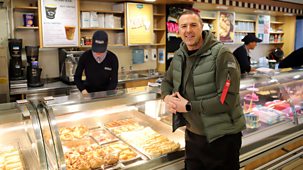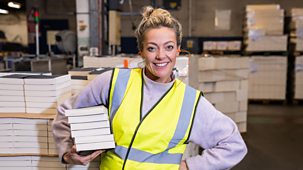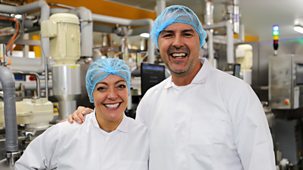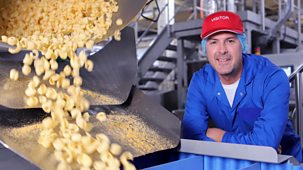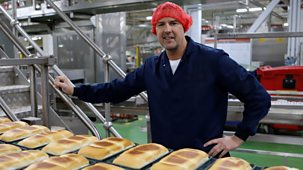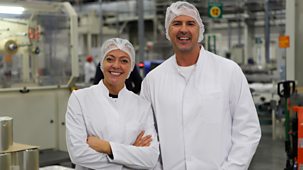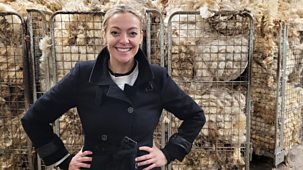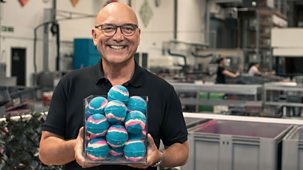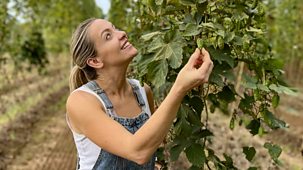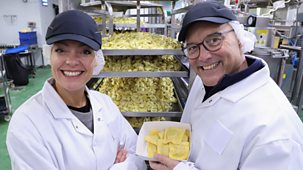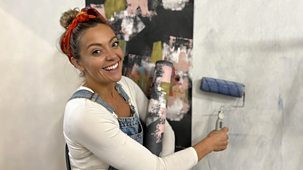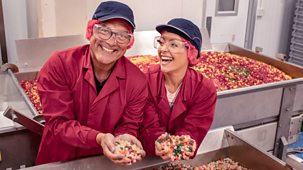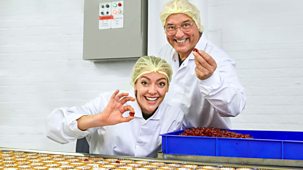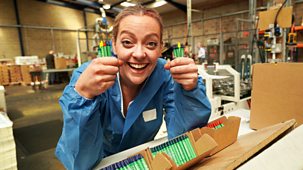
Series 4: 9. Pencils
Gregg Wallace is in Germany, at a historic factory which produces 600,000 pencils a day. At materials intake he is astonished that the main material in a pencil is not lead, but graphite. He helps mix this with clay to produce a 250-kilo batch – enough for 200,000 pencils. He also discovers why these pencils are hexagonal - because it stops them rolling off the table. And he performs an unusual quality check by throwing his finished pencils from a 25-metre-high tower. When they are chopped open the leads are still intact.\n \nMeanwhile, Cherry Healey is at Manchester University examining the astonishing properties of graphite. She discovers that this highly conductive form of carbon is also able to withstand temperatures up to 3,000 degrees Celsius. More surprising still, if you strip a single layer of atoms from its surface, you produce an entirely new material known as graphene. Thin and virtually invisible, embedding this in our phone screens could mean that in future we could simply roll them up. She is also investigating the science behind graphology and asking if we can evaluate personality from handwriting style.\n\nHistorian Ruth Goodman is on the trail of the very earliest pencils in the Lake District. It is a story which begins in the 15th century with the discovery of a huge deposit of pure graphite in the Borrowdale valley. Carved into sticks and wrapped in string, it made a brilliant writing tool. Ruth is also wondering if, in this modern digital age, the pencil is outdated technology. But she finds documents that show the death of handwriting has been prematurely announced on many occasions, dating right back to the invention of the printing press.
Source: BBC 2
Most recent episodes of Inside the Factory
Inside The Factory
Series 9: 6. Sausage Rolls
Paddy McGuinness explores the secrets of the McColgan’s bakery in Strabane, Northern Ireland, to reveal how it makes more than half a million sausage rolls a day. \n\nAft ...
09-02-2025
BBC 2
Inside The Factory
Series 9: 5. Hardback Books
Paddy McGuinness visits the Clays book factory in Suffolk to learn how they produce 20,000 copies of Pride and Prejudice for publisher Penguin. The factory makes an astonishing ...
02-02-2025
BBC 2
Inside The Factory
Series 9: 4. Flapjacks
In this episode, Paddy McGuinness explores the secrets of the Graze factory in west London, revealing how they make 40 million flapjacks a year. \n\nArmed with a trusty tasting ...
26-01-2025
BBC 2
Inside The Factory
Series 9: 3. Cheese Curls
In this episode, Paddy McGuinness explores the secrets of the Walkers factory in Lincoln, to reveal how it makes 500 million packs of Quavers every year. \n\nPaddy begins by mee ...
19-01-2025
BBC 2
Inside The Factory
Series 9: 2. Sliced Bread
In a nostalgic episode of Inside the Factory, new presenter Paddy McGuinness visits the Warburtons bread factory in his hometown of Bolton, where he once worked as a youngster m ...
12-01-2025
BBC 2
Inside The Factory
Series 9: 1. Chocolate Seashells
Paddy McGuinness is fully immersing himself in the festive spirit as he explores a huge chocolate factory in Belgium. With lots of taste tests to enjoy along the way, he embrace ...
28-12-2024
BBC 2
Inside The Factory
Series 8: 7. Carpets
Gregg Wallace explores the Axminster factory in Devon to reveal how it produces 46,000 square metres of carpet every year. He follows the production of one of their best sellers ...
15-11-2024
BBC 2
Inside The Factory
Series 8: 6. Bath Bombs
Gregg Wallace visits the colourful and fragrant Lush factory in Dorset to learn how an astonishing 14 million bath bombs are produced every year.\n\nCherry Healey visits Loughbo ...
09-10-2024
BBC 2
Inside The Factory
Series 8: 5. Stout
Gregg Wallace explores the secrets of the Guinness brewery in Dublin to reveal how it makes two million litres of Irish stout every single day.\n\nCherry Healey visits a water t ...
02-10-2024
BBC 2
Inside The Factory
Series 8: 4. Stuffed Pasta
Gregg Wallace explores the Dell Ugo factory in Hertfordshire to reveal how it makes 500 million stuffed pasta parcels every year. \n\nHe’s following production of one of ...
25-09-2024
BBC 2
Most popular episodes of Inside the Factory
Inside The Factory
Series 9: 5. Hardback Books
Paddy McGuinness visits the Clays book factory in Suffolk to learn how they produce 20,000 copies of Pride and Prejudice for publisher Penguin. The factory makes an astonishing ...
02-02-2025
BBC 2
Inside The Factory
Christmas 2018
Chocolates are an essential part of many people's festive celebrations. In this Christmas special, Gregg Wallace visits a factory which produces a staggering two million tins of ...
24-12-2023
BBC 2
Inside The Factory
Series 8: 10. Paint And Wallpaper
Gregg Wallace explores the Farrow & Ball factory in Dorset to learn how they produce up to 200,000 litres of paint and 10,000 metres of wallpaper a week. They make 270 different ...
15-03-2024
BBC 2
Inside The Factory
Series 9: 3. Cheese Curls
In this episode, Paddy McGuinness explores the secrets of the Walkers factory in Lincoln, to reveal how it makes 500 million packs of Quavers every year. \n\nPaddy begins by mee ...
19-01-2025
BBC 2
Inside The Factory
Series 9: 4. Flapjacks
In this episode, Paddy McGuinness explores the secrets of the Graze factory in west London, revealing how they make 40 million flapjacks a year. \n\nArmed with a trusty tasting ...
26-01-2025
BBC 2
Inside The Factory
Series 8: 2. Jelly Beans
Gregg Wallace explores the Jelly Bean Factory in Dublin to reveal the incredible processes it employs to make ten million colourful little sweets every day.\n\nCherry Healey vis ...
05-09-2024
BBC 2
Inside The Factory
Series 5: 1. Cherry Bakewells
Gregg Wallace is in Stoke-on-Trent at an enormous cherry bakewell factory where they produce 250,000 little tarts every day. He follows the production of cherry bakewells, from ...
03-08-2023
BBC 2
Inside The Factory
Series 6: Ice Cream
Gregg Wallace visits a family-run factory in the heart of rural Aberdeenshire, which churns out more than 49 tonnes of dairy ice cream every day. Gregg is delighted to learn he& ...
21-05-2023
BBC 2
Inside The Factory
Christmas 2017
In this Christmas special, Gregg Wallace, Cherry Healey and Ruth Goodman explore the fascinating factory processes and surprising history behind favourite festive treats.\n\nGre ...
23-12-2022
BBC 2


